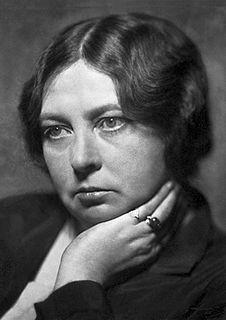A Quote by Hans Urs von Balthasar
The Christian response is contained in these two fundamental dogmas: that of the Trinity and that of the Incarnation. In the trinitarian dogma God is one, good, true, and beautiful because he is essentially Love, and Love supposes the one, the other, and their unity.
Related Quotes
The whole story of creation, incarnation, and our incorporation into the fellowship of Christ's body tells us that God desires us, as if we were God, as if we were that unconditional response to God's giving that God's self makes in the life of the Trinity. We are created so that we may be caught up in this, so that we may grow into the wholehearted love of God by learning that God loves us as God loves God.
In the dominant Western religious system, the love of God is essentially the same as the belief in God, in God’s existence, God’s justice, God’s love. The love of God is essentially a thought experience. In the Eastern religions and in mysticism, the love of God is an intense feeling experience of oneness, inseparably linked with the expression of this love in every act of living.
The "name" of the Most Holy Trinity is in a certain way impressed upon everything that exists, because everything that exists, down to the least particle, is a being in relation, and thus God-relation shines forth, ultimately creative Love shines forth. All comes from love, tends toward love, and is moved by love, naturally, according to different grades of consciousness and freedom... The strongest proof that we are made in the image of the Trinity is this: only love makes us happy, because we live in relation, and we live to love and be loved.
The Christian is in a different position from other people who are trying to be good. They hope, by being good, to please God if there is one; or — if they think there is not — at least they hope to deserve approval from good men. But the Christian thinks any good he does comes from the Christ-life inside him. He does not think God will love us because we are good, but that God will make us good because He loves us; just as the roof of a greenhouse does not attract the sun because it is bright, but becomes bright because the sun shines on it.
Love...is not merely a feeling. It is a deep unity, maintained by the will and deliberately strengthened by habit; reinforced by (in Christian marriages) the grace which both partners ask, and receive, from God. They can have this love for each other even at those moments when they do not like each other; as you love yourself even when you do not like yourself.
There are two kinds of love: we love wise and kind and beautiful people because we need them, but we love (or try to love) stupid and disagreeable people because they need us. This second kind is the more divine because that is how God loves us: not because we are lovable but because He is love, not because He needs to receive but He delights to give.
I have decided to love. If you are seeking the highest good, I think you can find it through love. And the beautiful thing is that we are moving against wrong when we do it, because John was right, God is love. He who hates does not know God, but he who has love has the key that unlocks the door to the meaning of ultimate reality.
What makes art Christian art? Is it simply Christian artists painting biblical subjects like Jeremiah? Or, by attaching a halo, does that suddenly make something Christian art? Must the artist’s subject be religious to be Christian? I don’t think so. There is a certain sense in which art is its own justification. If art is good art, if it is true art, if it is beautiful art, then it is bearing witness to the Author of the good, the true, and the beautiful
In the West, marriage is collapsing because it is based on love. And a marriage that is based on love is bound to fail. There is a reason for this: whenever two persons fall in love, both of them present what is beautiful in themselves to the other and hide the ugly. When you fall in love, whether you are a man or a woman, you show your most beautiful face to the other - but it is not your reality, it is not your totality.
The most effective way to close down the human mind and to manipulate its sense of self is to program into it some form of dogma. A dogma will always vehemently defend itself from other information and repel any alternative opinion which contradicts its narrow, solidified view. Dogmas become a person's sense of security and means of retaining power, and humanity tends to cling to both until its knuckles turn white. Dogmas take endless forms, and when you can persuade different people to hold opposing dogmas, the manipulation of conflict and control through "divide and rule" becomes easy.



































